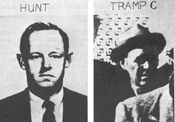Template:Are You Sure/October 9: Difference between revisions
No edit summary |
No edit summary |
||
| (4 intermediate revisions by the same user not shown) | |||
| Line 1: | Line 1: | ||
[[File:E. Howard Hunt & One of the Three Tramps Arrested after JFK Assassination.jpg|link=E. Howard Hunt (nonfiction)|175px|thumb|CIA officer '''[[E. Howard Hunt (nonfiction)|Left: E. Howard Hunt]]'''. Right: "Three tramps" arrested after the assassination of John F. Kennedy.]] | [[File:E. Howard Hunt & One of the Three Tramps Arrested after JFK Assassination.jpg|link=E. Howard Hunt (nonfiction)|175px|thumb|CIA officer '''[[E. Howard Hunt (nonfiction)|Left: E. Howard Hunt]]'''. Right: "Three tramps" arrested after the assassination of John F. Kennedy.]] | ||
• ... that American intelligence officer and writer '''[[E. Howard Hunt (nonfiction)|E. Howard Hunt]]''' (9 October 1918 – 23 January 2007) was a CIA officer from 1949 to 1970; | • ... that American intelligence officer and writer '''[[E. Howard Hunt (nonfiction)|E. Howard Hunt]]''' (9 October 1918 – 23 January 2007) was a CIA officer from 1949 to 1970; that Hunt, along with [[G. Gordon Liddy (nonfiction)|G. Gordon Liddy]] and others, planned and committed [[Watergate scandal (nonfiction)|burglaries and other criminal undercover operations for the Nixon administration]]; and that after Hunt's death, his sons, Howard St. John Hunt and David Hunt, stated publicly that their father had recorded several claims about himself and others being involved in a [[conspiracy to assassinate President John F. Kennedy]]? | ||
• ... that mathematician and astronomer '''[[David Gregory (nonfiction)|David Gregory]]''' was | • ... that mathematician and astronomer '''[[David Gregory (nonfiction)|David Gregory]]''' | ||
(3 June 1659 – 10 October 1708) was "the first to openly teach the doctrines of the ''Principia'', in a public seminary ... in those days ... a daring innovation."? | |||
• ... that mathematician, scholar, and poet '''[[Claude Gaspard Bachet de Méziriac (nonfiction)|Claude Gaspard Bachet de Méziriac]]''' (9 October 1581 – 26 February 1638) wrote a translation, from Greek to Latin, of the ''Arithmetica'' of Diophantus; and that it was this very translation in which [[Pierre de Fermat (nonfiction)|Pierre de Fermat]] wrote his famous margin note claiming that he had a proof of Fermat's last theorem; and that the same text renders Diophantus' term παρισὀτης as ''adaequalitat'', which became Fermat's technique of ''adequality'', a pioneering method of [[Calculus (nonfiction)|infinitesimal calculus]]? | • ... that mathematician, scholar, and poet '''[[Claude Gaspard Bachet de Méziriac (nonfiction)|Claude Gaspard Bachet de Méziriac]]''' (9 October 1581 – 26 February 1638) wrote a translation, from Greek to Latin, of the ''Arithmetica'' of Diophantus; and that it was this very translation in which [[Pierre de Fermat (nonfiction)|Pierre de Fermat]] wrote his famous margin note claiming that he had a proof of Fermat's last theorem; and that the same text renders Diophantus' term παρισὀτης as ''adaequalitat'', which became Fermat's technique of ''adequality'', a pioneering method of [[Calculus (nonfiction)|infinitesimal calculus]]? | ||
• ... that French | • ... that French artillery officer '''[[Alfred Dreyfus (nonfiction)|Alfred Dreyfus]]''' (9 October 1859 – 12 July 1935) was falsely accused of treason, brought to trial, and convicted in 1884; that his enemies were motivated by anti-Semitism; that his trial became one of the most sensational political dramas in modern French history, with effects throughout Europe; and that Dreyfus was completely exonerated? | ||
Latest revision as of 07:32, 10 October 2020

• ... that American intelligence officer and writer E. Howard Hunt (9 October 1918 – 23 January 2007) was a CIA officer from 1949 to 1970; that Hunt, along with G. Gordon Liddy and others, planned and committed burglaries and other criminal undercover operations for the Nixon administration; and that after Hunt's death, his sons, Howard St. John Hunt and David Hunt, stated publicly that their father had recorded several claims about himself and others being involved in a conspiracy to assassinate President John F. Kennedy?
• ... that mathematician and astronomer David Gregory (3 June 1659 – 10 October 1708) was "the first to openly teach the doctrines of the Principia, in a public seminary ... in those days ... a daring innovation."?
• ... that mathematician, scholar, and poet Claude Gaspard Bachet de Méziriac (9 October 1581 – 26 February 1638) wrote a translation, from Greek to Latin, of the Arithmetica of Diophantus; and that it was this very translation in which Pierre de Fermat wrote his famous margin note claiming that he had a proof of Fermat's last theorem; and that the same text renders Diophantus' term παρισὀτης as adaequalitat, which became Fermat's technique of adequality, a pioneering method of infinitesimal calculus?
• ... that French artillery officer Alfred Dreyfus (9 October 1859 – 12 July 1935) was falsely accused of treason, brought to trial, and convicted in 1884; that his enemies were motivated by anti-Semitism; that his trial became one of the most sensational political dramas in modern French history, with effects throughout Europe; and that Dreyfus was completely exonerated?